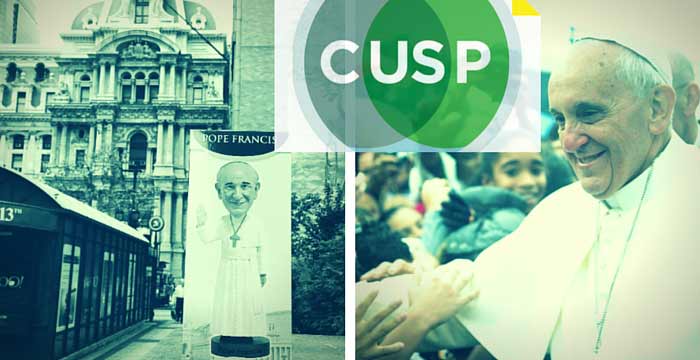
Pope Verde: Why We Love Pope Francis in Philly – (And You Should, Too!)
Post by Dr. Raluca Ellis for CUSP. Dr. Raluca Ellis is the Environmental Scientist for The Franklin Institute and Program Director of the Climate & Urban Systems Partnership. Her expertise is in communicating complex topics such as climate change to general audiences. She holds a doctoral degree in environmental chemistry and was a postdoctoral fellow at Harvard University.
It’s #PopeinPhilly week!
Whether you’re frustrated by all the street closures and our city taken over by port-a-potties, or are enjoying a pint of Holy Wooder (a very delicious Belgian-style tripel from Philadelphia Brewing Company) and can’t wait to catch a glimpse of His Holiness on the jumbotron, you’re inevitably being affected by this historic visit.
But before Pope Francis arrives in Philadelphia this weekend, he will already have made waves in Washington, D.C. and New York City. Thursday morning in Washington, the Pope will address a joint session of the House and Senate, the first address to Congress by a pope. On Friday in New York City, Pope Francis will attend the United Nations General Assembly, right before the nations of our world will vote on Sustainable Development Goals.
The message he will bring to these audiences will undoubtedly include taking action on climate change. This past summer, Pope Francis released his encyclical letter, a papal letter that is distributed to all Catholic bishops around the world and becomes part of the social teachings of the Church. If you don’t have time to read the whole thing, check out some key excerpt here.
In the Encyclical, Pope Francis describes climate as a common good, belonging to all and meant for all. He stresses climate change as a challenge with grave implications in the economic, social, environmental and political spheres.
Pope Francis also acknowledges the human role in causing climate change, by burning non-renewable energies from coal, oil and natural gas and releasing vast amounts of heat-trapping gases. But while the challenge is big, his message ends with optimism.
“Yet all is not lost. Human beings, while capable of the worst, are also capable of rising above themselves, choosing again what is good, and making a new start, despite their mental and social conditioning. We are able to take an honest look at ourselves, to acknowledge our deep dissatisfaction, and to embark on new paths to authentic freedom.”
Whether you’re religious or not, we can all learn from the Pope’s message. Learning to change our throwaway culture, relying less on non-renewable energy sources, and ensuring that all members of our communities are resilient in the face of climate change are all things within our personal power.
Remember, we do not inherit the Earth from our ancestors; we borrow it from our children.






